Help make an impact this season
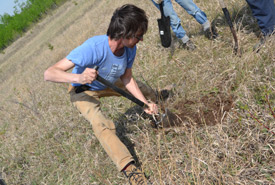
Matthew Braun demonstrates how to plant a seedling (Photo by NCC)
When it comes to nature conservation, a little goes a long way. Small-scale conservation efforts can have a huge impact and help ensure that we and future generations can enjoy precious natural spaces. With fall quickly approaching, the Nature Conservancy of Canada (NCC) is asking Canadians to continue contributing to conservation by keeping the following tips and tricks in mind while exploring both your backyard and Canada’s landscapes:
Be for the birds
Sadly, many of our nation’s bird populations are decreasing because of threats in their summer and winter ranges. To help counter this trend, NCC has protected habitat for more than 375 bird species, both common and endangered. You can help reduce their decline by providing safe resting areas and habitat in your backyard. To do this, plant native shrubs where birds can rest, nest and feed.
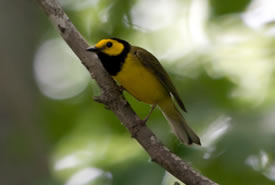
Hooded warbler (Photo by Bill Hubick)
Hear the buzz
Pollinators such as bees, butterflies and moths are critical to several native plant species and crops. These pollinators visit flowers to feed on their nectar, moving pollen from one plant to another in the process. This fertilizes flowers and allows them to produce seeds. Unfortunately, several pollinator species are at risk of extinction. NCC helps conserve crucial pollinator habitat by protecting and restoring natural areas. You can help by creating pollinator habitat in your own yard. By planting milkweed, you’re providing food for monarch butterflies, and growing various native flowers that bloom can help attract pollinators to your garden.
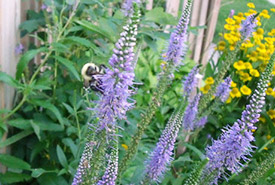
Bee pollinating a speedwell plant (Photo by Jaimee Morozoff, NCC staff)
Soak it all in
Rain and melted snow from our yards ultimately reach local bodies of freshwater. By reducing water runoff from your yard, you can help decrease pollutants that flow into lakes, rivers and streams.
Holding more water in your yard can assist in conserving aquatic ecosystems. Consider building a pond, rain garden or wetland in your garden. You could also reroute downspouts into garden beds to keep your lawn naturally maintained and/or install rain barrels, which hold runoff from your roof.
Join the dark side
Not only does artificial lighting make it difficult to see stars in the night sky, it also affects nature’s natural rhythms, especially those of bats, migrating birds and many insects. NCC’s properties provide sanctuaries for wildlife that are active both during the day and at night. To reduce light pollution, avoid putting big, bright lights outside, turn off any outdoor lights while you’re inside and keep your curtains and/or blinds closed at night.
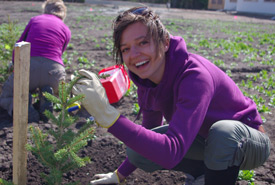
Volunteers planting native spruce on Fleming property (Photo by NCC)
Keep it native
Believe it or not, many plants in our yards are not actually native and originate from another area. Non-native plants can sometimes be invasive, infringing on nearby natural areas and negatively impacting native plants. Not only are native plants beautiful and diverse, they also provide birds and pollinators with better habitat compared to non-native plants.
This summer, conduct an audit of non-native, invasive plants in your yard. Once you’ve identified these plants, remove them from your yard and consider replacing them with native species. To learn more about native gardening, check out this article.
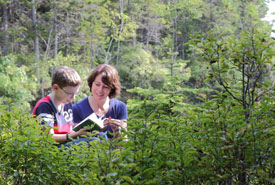
Musquash Estuary, NB (Photo by Mike Dembeck)
Leave no trace
Whether you’re visiting one of NCC’s Nature Destinations or strolling through a park this summer, be sure to make as little impact as possible. NCC has partnered with Leave No Trace Canada, to provide Canadians with several low-impact travel principles to follow. These include planning ahead and preparing, travelling on durable surfaces (i.e. established trails, rock, gravel and dry grasses), disposing of waste properly, leaving what you find, respecting wildlife and being considerate of other visitors.


